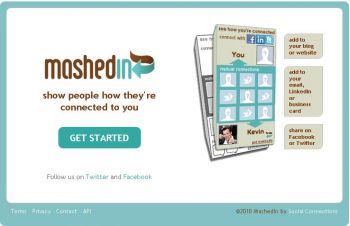
Social Connections has released MashedIn.com, an application that allows you to identify mutual connections across multiple social networks. MashedIn provides a widget that you can add to a web site or blog where your users can authenticate with either Facebook, Twitter, or LinkedIn to reveal common connections to the widget owner.
Individuals have various groups of friends or connections on different social networks they use on a regular basis. Being able to see mutual connections across lots of networks steps-up the chance you will find common linkages. MashedIn provides a key value to companies and business professionals. You can visit a business web presence or profile and be able to learn if anyone they know is connected. For the business, it is like obtaining a close introduction to someone who is otherwise completely anonymous. Each connection you uncover offers more context for the visitor.
The MashedIn team overcame significant technological obstructions to make the application. “MashedIn is deployed entirely in the cloud on Google App Engine,” notes CTO Jason Collins. “This framework, combined with MashedIn’s parallel processing extensions, allows us to query social networks in a massively parallel manner and traverse large graphs of social connections. This approach allows for relevant, meaningful social connections and recommendations to be presented to the user almost instantaneously, despite having to gather and process large amounts of data from a number of third-party sources.”
Social Connections, based in Saskatoon, Canada, produces software to leverage social networks and improve trust. The foremost solution released by the company in early 2009 was a reputation management toolkit for small businesses called StepRep. MashedIn is designed to have deeper applicability for people to improve trust and identity through social connections.
Social Connections is a wholly owned subsidiary of VendAsta Technologies, which raised $3 million in the summer of 2008.
Update: Links in this post have been removed, as they weren’t working at last check. November 16, 2014.